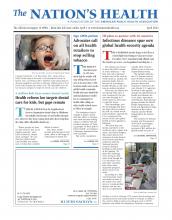Uninsured young adults are more likely to be diagnosed with advanced stages of cancer, many which could be treated if caught early, a recent study says.
Young uninsured men were 1.5 times more likely to have advanced cancer than people with insurance while young uninsured women were nearly 1.9 times more likely, according to an American Cancer Society study published online Jan. 28 in Cancer. The research included more than 285,000 cancer cases of patients ages 15-39 from the National Cancer Data Base.
Uninsured patients were more likely to be black or Hispanic, younger and male, the study said. They were also more likely to live in low-income areas, live in the South and in reside in areas with a greater number of people without high school diplomas. The most common cancers among the group included breast, thyroid and lymphoma — cancers that respond better to treatment if detected early, the study said.
The results speak to the importance of getting young adults signed up for health insurance coverage under the Affordable Care Act, said study author Anthony Robbins, MD, PhD, the American Cancer Society’s director of health services research in the society’s Intramural Research Department.
But Robbins said young adults are hard to reach as they begin college or their first jobs, leaving the risk of cancer off their radar screens.
“This group is less likely to have regular contact with their primary care doctor, they’re less likely to participate in clinical trials, they’re the less likely group of any age to participate in cancer research studies,” Robbins told The Nation’s Health. “It’s confusing a lot of times who is supposed to take care of them. They’re sort of in this no man’s land in between pediatric cancers and older adult cancers.”
There were 18 million uninsured young adults ages 19-34 in 2012, according to U.S. census data, accounting for 40 percent of uninsured Americans younger than 65. The number of uninsured young adults ages 19-25 decreased after the Affordable Care Act started allowing dependents ages 26 and younger to stay on their parents’ insurance plans as of 2010.
Until the Affordable Care Act became law, young adults diagnosed with cancer confronted the possibility of a lifetime of being uninsurable at a time they needed a lifetime of follow-up care, Robbins said. Young cancer survivors are still at risk for second cancers related to treatment for the first cancer, in addition to lung, cognitive and orthopedic problems, he said.
Creative messaging from health agencies, such as the U.S. Department of Health and Human Services, is needed to catch the attention of young adults. Public service announcements using celebrities can be one way to appeal to this demographic, he said. One such example is the HHS #GetCovered campaign, which features celebrities such as actress Kerry Washington and singer Pharrell Williams telling Americans why health insurance is important.
For more information, visit http://onlinelibrary.wiley.com/doi/10.1002/cncr.28568/abstract.
- Copyright The Nation’s Health, American Public Health Association









